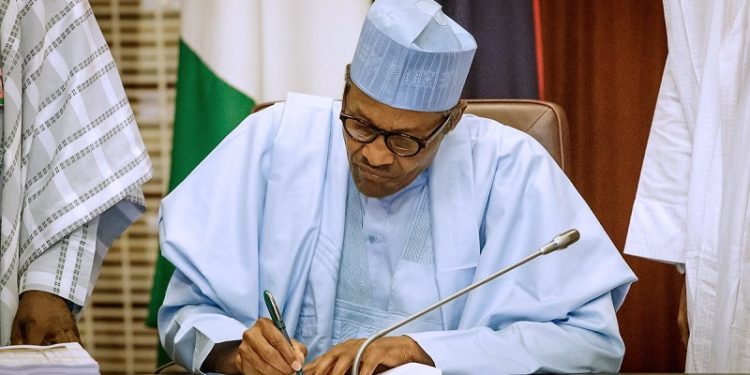President Muhammadu Buhari has officially written to the National Assembly, indicating rejection of his assent to the Electoral Act Amendment Bill, 2021. For the past month, there has been intense worry and speculations on whether he would sign or not. In the run up to the Sunday deadline for his signature, many media organs were running a daily countdown – will he sign, will he refuse, who is influencing him, whose side is he on and so on. The reason is simple, the bill is very important and has within it major policy gains on improving the integrity of our elections.
The other element that fuelled controversy is the diametrically opposed position taken by state governors on one side and federal legislators on the other on the issue. In an interesting power game, most state governors openly canvassed support for delegate-driven conventions for party primaries. Their reasoning is well known to Nigerians, they have almost total control of political structures in their states so whoever they want “wins” primaries held in the state. Many legislators are apprehensive that their governors, as they usually do, love changing legislators at each election so that no one within the state builds sufficient political capital to become a major actor. Based on their fear, most legislators lined up in favour of primaries through direct election thinking that is their best bet in preventing the governor from making them ex-legislators. Nigerians were very curious about whose side the president would emerge. Now we know, he is on the side of governors, not legislators. Very little has been heard on who is on the side of the people in this debate. One of my concerns is that the president should have engaged directly with Nigerians on the matter by raising his concerns directly in a public forum and listening to the views of the people.
The president’s rejection of the bill was conveyed in letters read in the two chambers of the National Assembly on Tuesday by the Senate President, Ahmad Lawan and the Speaker of the House of Representatives, Femi Gbajabiamila in which he explained his reasons for the declining assent to the bill. He said he got relevant advice from all concerned ministries, departments and agencies. He cited financial, security and legal consequences for rejecting the bill. He also added that the bill would infringe on the rights of Nigerians to participate in governance and democracy, specifically that:
“The amendment as proposed is a violation of the underlying spirit of democracy, which is characterised by freedom of choices of which political party membership is a voluntary exercise of the constitutional right of freedom of association.” He pointed out that the existing constitutions of political parties already registered with INEC permits direct, indirect and consensus primaries and the proposed bill will violate this right they have to choose their preferred option.
I must confess that I am less convinced than the legislators that direct primaries are not as susceptible to manipulation as the delegates system. Let us take the example from the political life of President Buhari himself. In the run up to the 2019 general elections, President Muhammadu Buhari secured 2,931,235 votes at the presidential primary election held purportedly across the 484 wards in the 44 local government areas of Kano State. The votes were, to use clear Nigerian language, delivered by Governor Abdullahi Ganduje, who had made the promise of delivering more votes than any other state. Ganduje: “Attributed the massive turnout of registered party members during the primary to stakeholders’ effort at mobilising party members to consolidate the gains of direct primary election process.” The question then became where were the party members during the 2019 elections when President Muhammadu Buhari won only 1,464,768 (78.9 per cent) of the total votes cast to beat the Peoples’ Democratic Party presidential candidate, Atiku Abubakar, who polled 391,593 (21.1 per cent). Kano had 5,391,581 registered voters, out of which 2,006,410 voters were accredited for the presidential election while the total votes cast was 1,964,751, which itself is a very high number. Clearly, the primary election numbers were manufactured and reports at the time said people were not observed voting in most polling units for the primaries and yet nearly three million were said to have voted. The president’s awareness of the manufacture of numbers in direct primary elections may have influenced his decision. I that case, he should have said so.
In his letter, the president has argued that the conduct of direct primaries across the 8,809 wards across the length and breadth of the country will lead to a significant spike in the cost of conducting primary elections by parties as well as increase in the cost of monitoring such elections by INEC, which has to deploy monitors across these wards each time a party is to conduct direct primaries for the presidential, gubernatorial and legislative posts. We all know the reality, many parties do not have members in all the wards, not even in all the local governments in the country. In any case, there is no specification that direct primaries must hold in all wards in the country. What makes sense is for political parties to organise primaries according to their preference, size, membership and capacity.
The president is right to point out that the existing constitutions of the parties already registered with the Independent National Electoral Commission (INEC) permit direct, indirect and the consensus primaries. The National Assembly by imposing direct primaries on all parties has clearly narrowed the choice of party members and indeed Nigerians. They should not have acted in consideration of their self-interest alone. In any case, most parties do not have reliable and verified Membership Register or valid means of identification, which therefore means non-members can be recruited to vote by wealthy contestants to influence the outcome. Rival parties can also conspire and mobilise people to vote against a good or popular candidate in a party during its primaries just to pave way for their own candidates.
Moving forward, the key issue is that the bill is extremely important for the development of electoral democracy and integrity in Nigeria and should be processed and returned to the president as soon as possible. On Tuesday, the Senate was sufficiently irritated by the president’s action and appeared to be collecting signatures to override his veto. As we all know, however, this National Assembly has no capacity to resist the president. In that case, they should stay in character, apologise to the president for including section 85, which annoyed him, remove the section immediately and return it to him for his signature as that is the only section he clearly objected to. We must not return to the position in 2019 when the president rejected the Amendment Bill and we had to fall back to use the Electoral Act 2010 (as amended). That Act is today problematic because the Supreme Court has ruled that the INEC Manual that recognises the use of Card Reader in authenticating voters in any election is illegal and voided it. In this context, the provision for the electronic transmission of results in the proposed bill is extremely important for our democratic progress and must not be allowed to fall, we cannot throw away the bath water with the baby. The National Assembly should therefore simply remove the clause imposing direct primary elections on all political parties and repass the bill to the president for his signature.

 Join Daily Trust WhatsApp Community For Quick Access To News and Happenings Around You.
Join Daily Trust WhatsApp Community For Quick Access To News and Happenings Around You.


